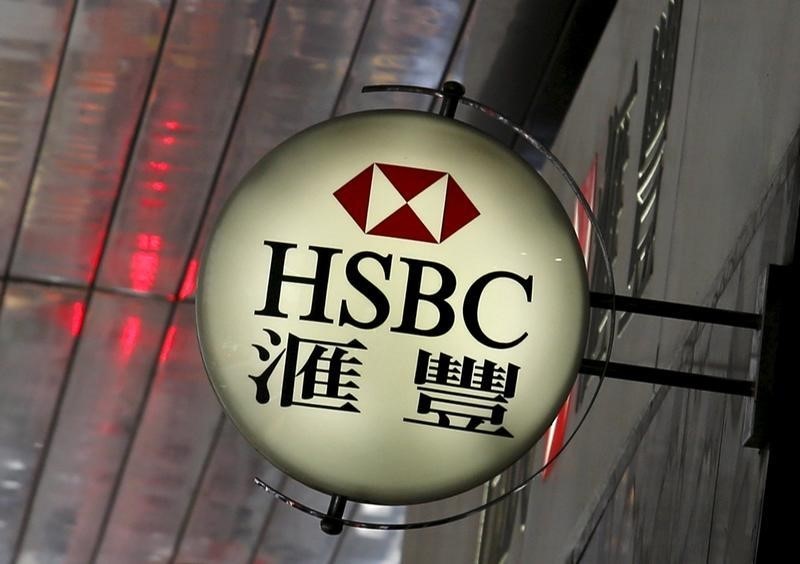By Lawrence White
LONDON (Reuters) - Britain's HSBC (L:HSBA) is seeking to release billions of dollars of capital tied up in the United States without upsetting the country's politicians and regulators, senior sources at the bank said.
HSBC, which has been in the sights of U.S. regulators over breaching anti-money laundering rules, has more than $20 billion of capital in the United States earning a slim 1 percent return, of which up to half could be returned to the holding company via asset sales, analysts and investors say.
The bank's investors are currently missing out on higher profits and more secure dividends as a result of this hefty U.S. balance sheet. The bank earns a return on equity of just 1.4 percent on this, compared with 5 percent for HSBC globally and 13 percent for major U.S. commercial bank rivals, according to Deutsche Bank research.
"The issue is a valid one, as it appears that the capital in the USA is earning low returns," said Richard Marwood, Senior Fund Manager at Royal London Asset Management, which owns HSBC shares. "As shareholders we are concerned about where companies deploy capital and what the long term returns on that capital are."
HSBC holds so much capital in the United States, in part, because after the 2008 financial crash and the collapse of Lehman Brothers, U.S. regulators and others around the world made foreign banks operating on their soil boost capital to bolster their strength.
This trend has forced banks, including Barclays (L:BARC), Deutsche Bank (DE:DBKGn) and HSBC, to hold billions of dollars more in their U.S. businesses, putting pressure on profitability.
It also partly relates to a drawn-out sale process for Household, the consumer lending business HSBC bought in 2003 in an ill-fated $16 billion deal.
The bank's ability to take capital out of the United States is subject to it submitting plans to do so to the Federal Reserve.
HSBC passed an annual U.S. stress test in July, paving the way for the bank to remit a maximum of $2.5 billion of excess cash in 2017 to its holding company in Britain with the full approval of the Fed.
"Any return of capital would always be subject to receiving a non-objection from the Federal Reserve,” HSBC chief financial officer Iain Mackay told Reuters in a telephone interview.
POLITICAL CLIMATE
The U.S. authorities have a track record for being tough on European banks and have imposed big financial penalties on some for past misdeeds.
HSBC struck a deferred prosecution agreement (DPA) in 2012 with the U.S. Department of Justice under which it would not be heavily punished for failures in anti-money laundering efforts, subject to the bank committing to improve controls.
"The DPA, which could drag out, and [other] outstanding investigations probably mean the U.S. authorities would be more comfortable that capital stayed within the U.S.," another major HSBC investor said.
The Federal Reserve Board and the Department of Justice declined to comment.
Some of the HSBC sources, who declined to be identified, said taking more capital home would also prove a challenge when the political climate in the United States is hostile to banks, and there is the added uncertainty of the Nov. 8 presidential election.
HSBC has $33 billion dollars of capital allocated to its North American businesses, according to a Deutsche Bank analysis on Aug. 30, of which just $6 billion, mainly the Canada business, is making a healthy return of 9 percent.
"...the scope and scale of capital HSBC has allocated to North America is sub-optimal for shareholders and needs to be revisited," Deutsche analysts wrote.
Analysts and investors have different views on how much capital the bank could free up while still keeping a viable U.S. business, but they put the range at $5-10 billion dollars.
HSBC pays dividends to investors from its holding company HSBC Holdings Plc, whose ability to pay out has come under pressure partly as a result of weaker revenues and also regulatory demands to retain capital.
"While we would like to see returns increase, or failing that redeployment of capital into markets outside the U.S., it is for the company to best decide how to achieve this and how to manage its relationship with local regulators," Marwood of RLAM said.
